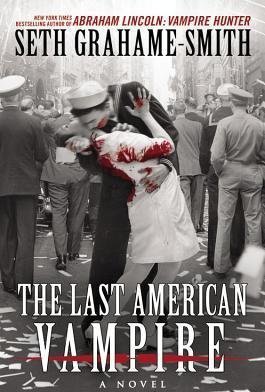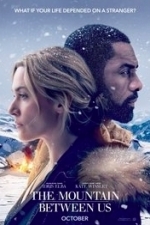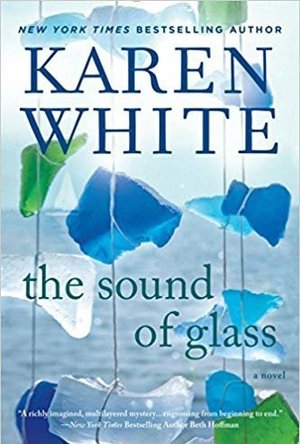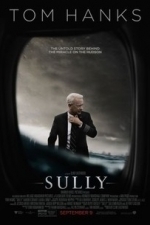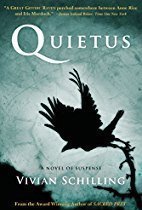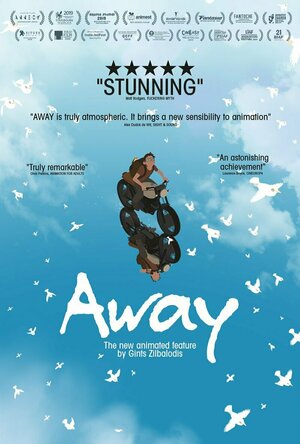Search
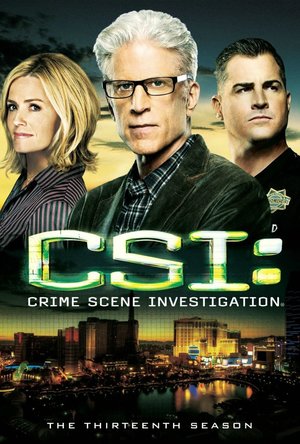
CSI: Crime Scene Investigation - Season 13
TV Season
D.B. and Finn hunt for missing Kaitlyn, while Sara convinces Nick to return to the Las Vegas Crime...
Merissa (13780 KP) rated Shot Across the Bow (Deep Six #5) in Books
Nov 29, 2021 (Updated Jul 10, 2023)
SHOT ACROSS THE BOW is the fifth book in the Deep Six series and is the turn of Romeo and Mia. Romeo - as you can tell by the nickname - is a love 'em and leave 'em kind of guy, whereas he thinks Mia has relationship written all over her. So, they both put each other in the dreaded #FriendZone, even though that's not where either of them wants to be.
If one good thing could come out of a plane crash, it's that it got them talking and stopped skirting around the edges. Once a certain conversation happens, all bets are off as to what will happen next. They both have a lot of emotional trauma and baggage to work through.
Doc and Cami meet for the first time in this book and the sharp-edged banter starts, which I think will continue all the way through their book. We don't see much of any of the others, and nothing at all of Wolf and Chrissy from book four.
There's not much at all of the historical story to this one, so I didn't get as much as I wanted, but that's probably just me. The mystery side of it didn't really grab me either as I thought it was quite obvious who was behind it, and what the reasons were.
On the whole, this was a steamy read with lots of sexual tension to begin with. I enjoyed this story and have no hesitation in recommending it.
** same worded review will appear elsewhere **
* A copy of this book was provided to me with no requirements for a review. I voluntarily read this book, and the comments here are my honest opinion. *
Merissa
Archaeolibrarian - I Dig Good Books!
Nov 29, 2021
If one good thing could come out of a plane crash, it's that it got them talking and stopped skirting around the edges. Once a certain conversation happens, all bets are off as to what will happen next. They both have a lot of emotional trauma and baggage to work through.
Doc and Cami meet for the first time in this book and the sharp-edged banter starts, which I think will continue all the way through their book. We don't see much of any of the others, and nothing at all of Wolf and Chrissy from book four.
There's not much at all of the historical story to this one, so I didn't get as much as I wanted, but that's probably just me. The mystery side of it didn't really grab me either as I thought it was quite obvious who was behind it, and what the reasons were.
On the whole, this was a steamy read with lots of sexual tension to begin with. I enjoyed this story and have no hesitation in recommending it.
** same worded review will appear elsewhere **
* A copy of this book was provided to me with no requirements for a review. I voluntarily read this book, and the comments here are my honest opinion. *
Merissa
Archaeolibrarian - I Dig Good Books!
Nov 29, 2021
My rating: 3.5
<i>This eBook was provided by the publisher via NetGalley in exchange for an honest review</i>
Before beginning this book readers need to be aware, particularly those of a more fragile nature, that it contains themes of mental illness, sexual abuse and suicidal tendencies; but that does not mean this is not a great book. The strap line on the cover of <i>Black Box</i> by Cassia Leo says “Not just another love story” implying that whilst it does fall under the romantic genre there is something more to the novel.
The book begins, in a way, with a cliffhanger. The date is January 8th and the narrator appears to be about to experience, and possibly die, in a plane crash. Before the author reveals the outcome she back tracks to January 3rd where the story, <i>Black Box</i>, genuinely begins.
There are two main characters and the narrative constantly changes from one point of view to the other. This helps the reader to understand both characters’ experiences: past and present. Nineteen-year old Mikki wants to kill herself. She has tried more than once in the past but this time she has a more detailed plan, one that her family would be unable to interfere with. By lying about her real intentions she books a flight to Los Angeles to get as far away from Boston as she can, however she does not anticipate the severe snowy weather which cancels all flights for the next few days.
Stranded at the airport she meets Crush, a guitar playing Harvard student who was meant to be on the same flight as her. With the niggling feeling that he has met her before, Crush convinces Mikki to go to a coffee shop with him and later, sensing her reluctance to return home, offers to share a double bedroom suite with her at a local hotel until the flights can be rescheduled. During this time together Crush works out why he recognizes Mikki. He once saved her life after she was physically abused and can prove this as he left the only copy of a book his grandpa wrote, titled <i>Black Box</i>, with her that night; a book she still possesses.
The few days they spend in each other’s company helps Mikki more than the years of therapy she has endured since being diagnosed with bipolar. It also helps Crush deal with his own demons and both of them begin to realize they want to live. They also have fallen in love for the first time in their lives and begin to believe they were meant to be together.
It always seems unrealistic that characters in novels fall in love so quickly but their devastating pasts make the reader yearn for them to stay together; they both deserve some happiness and a life worth living. The first person narratives are written so well it is like reading a true story rather than fiction, which makes their experiences even more distressing. Sadly there are people in the world that would be able to relate to either Mikki or Crush, and depending on their current situation may prefer not to read this book. However, Leo has mentioned in her acknowledgments that readers have contacted her to share their own personal experiences.
The downside of this novel was the use of foul language. That may not bother some people, and it is evident that the world today is less shocked by swear words, but it is not necessary to include so much of it. The language was probably intended to make it more realistic and emphasize the pain the two characters feel. If it had only been during the dialogue that these words were used it would have been better than reading them throughout the narrative.
Although shocking and dark in nature, <i>Black Box</i> gets very gripping, especially as life seems to be looking up for Mikki, yet the reader has already read about the upcoming plane crash. With breath held in hope that everything will turn out okay, it is easy to rush through the final chapters. Whether or not there is a happy ending is something you will have to find out by reading it…
<i>This eBook was provided by the publisher via NetGalley in exchange for an honest review</i>
Before beginning this book readers need to be aware, particularly those of a more fragile nature, that it contains themes of mental illness, sexual abuse and suicidal tendencies; but that does not mean this is not a great book. The strap line on the cover of <i>Black Box</i> by Cassia Leo says “Not just another love story” implying that whilst it does fall under the romantic genre there is something more to the novel.
The book begins, in a way, with a cliffhanger. The date is January 8th and the narrator appears to be about to experience, and possibly die, in a plane crash. Before the author reveals the outcome she back tracks to January 3rd where the story, <i>Black Box</i>, genuinely begins.
There are two main characters and the narrative constantly changes from one point of view to the other. This helps the reader to understand both characters’ experiences: past and present. Nineteen-year old Mikki wants to kill herself. She has tried more than once in the past but this time she has a more detailed plan, one that her family would be unable to interfere with. By lying about her real intentions she books a flight to Los Angeles to get as far away from Boston as she can, however she does not anticipate the severe snowy weather which cancels all flights for the next few days.
Stranded at the airport she meets Crush, a guitar playing Harvard student who was meant to be on the same flight as her. With the niggling feeling that he has met her before, Crush convinces Mikki to go to a coffee shop with him and later, sensing her reluctance to return home, offers to share a double bedroom suite with her at a local hotel until the flights can be rescheduled. During this time together Crush works out why he recognizes Mikki. He once saved her life after she was physically abused and can prove this as he left the only copy of a book his grandpa wrote, titled <i>Black Box</i>, with her that night; a book she still possesses.
The few days they spend in each other’s company helps Mikki more than the years of therapy she has endured since being diagnosed with bipolar. It also helps Crush deal with his own demons and both of them begin to realize they want to live. They also have fallen in love for the first time in their lives and begin to believe they were meant to be together.
It always seems unrealistic that characters in novels fall in love so quickly but their devastating pasts make the reader yearn for them to stay together; they both deserve some happiness and a life worth living. The first person narratives are written so well it is like reading a true story rather than fiction, which makes their experiences even more distressing. Sadly there are people in the world that would be able to relate to either Mikki or Crush, and depending on their current situation may prefer not to read this book. However, Leo has mentioned in her acknowledgments that readers have contacted her to share their own personal experiences.
The downside of this novel was the use of foul language. That may not bother some people, and it is evident that the world today is less shocked by swear words, but it is not necessary to include so much of it. The language was probably intended to make it more realistic and emphasize the pain the two characters feel. If it had only been during the dialogue that these words were used it would have been better than reading them throughout the narrative.
Although shocking and dark in nature, <i>Black Box</i> gets very gripping, especially as life seems to be looking up for Mikki, yet the reader has already read about the upcoming plane crash. With breath held in hope that everything will turn out okay, it is easy to rush through the final chapters. Whether or not there is a happy ending is something you will have to find out by reading it…
Annie Chanse (15 KP) rated The Last American Vampire in Books
May 25, 2018
A Rare Case of The Sequel Being Better than the First Book
I loved this book. Honestly, I'm not certain that I didn't like it even more than "Abraham Lincoln: Vampire Hunter." One of my favorite things about both of these books is that Smith writes them like history books (complete with footnotes and actual photographs of things like Teddy Roosevelt posing with an elephant he'd just killed and Jack Ruby with his gun jammed into Lee Harvey Oswald's stomach). The facts he uses in his book are so... FACTUAL! I mean, seriously, the only thing keeping a person from reading these books as absolute truth is the fact that s/he doesn't believe vampires actually exist. But if a person DID believe in vampires? Oh yes, everything in these books is absolutely plausible. I can honestly see some confused people who are on the fence about whether or not vampires are real reading this book, finishing it, slamming it down, and saying, "I KNEW IT! I -KNEW- THEY WERE REAL!" Ha. Seriously though, the realism in these books is what makes them so much fun and so wonderful.
The thing I like about this book so much -- the thing that very possibly makes me enjoy this one more than the original -- is all that cameos in the book -- Mark Twain, Howard Hughes, Arthur Conan Doyle, Bram Stoker, Henry Irving, Eliot Ness.... I mean, HELLO?! What a stellar, badass cast of cameo characters. Although, honestly, "cameo" is not the most appropriate word because some of these characters played pretty major roles in the novel. It was fantastic. Viewing Howard Hughes' eccentricities and insanities through vampire-colored glasses is simply... perfect. It doesn't seemed forced at all. Wait, after a plane crash, Howard Hughes was turned into a vampire? ... Yeah, I can see that. That makes perfect sense. And it DOES! It is such an easy transition from mentally ill billionaire to crazy vampire. Not such a stretch. And Rasputin? OH yeah. That guy was TOTALLY a vampire. :-p
Anyway. Now I'm kind of rambling. But seriously, this book was fantastic, so much fun. There wasn't a single part of this book that I didn't love.
The thing I like about this book so much -- the thing that very possibly makes me enjoy this one more than the original -- is all that cameos in the book -- Mark Twain, Howard Hughes, Arthur Conan Doyle, Bram Stoker, Henry Irving, Eliot Ness.... I mean, HELLO?! What a stellar, badass cast of cameo characters. Although, honestly, "cameo" is not the most appropriate word because some of these characters played pretty major roles in the novel. It was fantastic. Viewing Howard Hughes' eccentricities and insanities through vampire-colored glasses is simply... perfect. It doesn't seemed forced at all. Wait, after a plane crash, Howard Hughes was turned into a vampire? ... Yeah, I can see that. That makes perfect sense. And it DOES! It is such an easy transition from mentally ill billionaire to crazy vampire. Not such a stretch. And Rasputin? OH yeah. That guy was TOTALLY a vampire. :-p
Anyway. Now I'm kind of rambling. But seriously, this book was fantastic, so much fun. There wasn't a single part of this book that I didn't love.
Emma @ The Movies (1786 KP) rated The Rhythm Section (2019) in Movies
Mar 5, 2020
The Rhythm Section popped up almost out of nowhere when it hit screens. Seeing the cast line-up I was very interested in seeing what it had to offer.
Stephanie has been a broken woman ever since her family died in a plane crash. The situation would be tough for anyone to deal with but it's made worse by the fact she was supposed to be on the plane too. Life in tatters, addicted to drugs and turning tricks for money she's all but given up on life. That's when Proctor appears.
Proctor is an investigative journalist who is tracking down the people responsible for the tragedy. He takes her in and she paws over his evidence. With a new found rage she goes off on her own, but actions have consequences and it's a steep learning curve.
There is something in The Rhythm Section, the story has a definite spark, but this final product didn't hit the right note for me. It's a classic story of revenge but the film doesn't seem to make much out of it. Littering it with flashbacks to fill in story and attempt to get us in Stephanie's head just adds to the jumpiness throughout. That jumpiness wasn't just reserved for the story, I noted that the camera movements early on were bizarre, I imagine in an effort to emulate her physical and mental state, but it was particularly jarring to watch.
The Rhythm Section seems to have no real way to follow the passage of time, which I feel was a mistake as it would have helped to make things more believable. Somehow B (Law) managed to get Stephanie off drugs, markedly improve her fitness levels and train her to be an (admittedly mediocre) assassin. With some concept of time elapsing I might have been on board with that transformation.
All that training seems to be for nought as she mainly survives off dumb luck during her travels. Her natural luck would also explain how she managed to capture the only bit of information she needed at the beginning of the film to find Proctor's well trained and secret source.
Law and Lively had some good moments in her training montage. There was some humour and friendship, of a sort, but the combative nature of both characters outside of that felt strained and neither appeared comfortable in the role. Sterling K. Brown playing Mark Serra seemed to be the most at home in the role, there was a spark there that gave him a confidence in what he was doing.
With a script written by the author of the source material I'm at a bit of a loss, this scenario should mean that it's a proper representation of the book but I'm left with little desire to experience any of the other three stories in this series having seen Rhythm Section.
As I said, there feels like there's something in this idea that would have made a great film, but it feels rushed and a little confused. The film ends in a way that could see a sequel, and that is possible given the other books in the series, but I can't see it progressing beyond one film off the back of this.
Originally posted on: https://emmaatthemovies.blogspot.com/2020/03/the-rhythm-section-movie-review.html
Stephanie has been a broken woman ever since her family died in a plane crash. The situation would be tough for anyone to deal with but it's made worse by the fact she was supposed to be on the plane too. Life in tatters, addicted to drugs and turning tricks for money she's all but given up on life. That's when Proctor appears.
Proctor is an investigative journalist who is tracking down the people responsible for the tragedy. He takes her in and she paws over his evidence. With a new found rage she goes off on her own, but actions have consequences and it's a steep learning curve.
There is something in The Rhythm Section, the story has a definite spark, but this final product didn't hit the right note for me. It's a classic story of revenge but the film doesn't seem to make much out of it. Littering it with flashbacks to fill in story and attempt to get us in Stephanie's head just adds to the jumpiness throughout. That jumpiness wasn't just reserved for the story, I noted that the camera movements early on were bizarre, I imagine in an effort to emulate her physical and mental state, but it was particularly jarring to watch.
The Rhythm Section seems to have no real way to follow the passage of time, which I feel was a mistake as it would have helped to make things more believable. Somehow B (Law) managed to get Stephanie off drugs, markedly improve her fitness levels and train her to be an (admittedly mediocre) assassin. With some concept of time elapsing I might have been on board with that transformation.
All that training seems to be for nought as she mainly survives off dumb luck during her travels. Her natural luck would also explain how she managed to capture the only bit of information she needed at the beginning of the film to find Proctor's well trained and secret source.
Law and Lively had some good moments in her training montage. There was some humour and friendship, of a sort, but the combative nature of both characters outside of that felt strained and neither appeared comfortable in the role. Sterling K. Brown playing Mark Serra seemed to be the most at home in the role, there was a spark there that gave him a confidence in what he was doing.
With a script written by the author of the source material I'm at a bit of a loss, this scenario should mean that it's a proper representation of the book but I'm left with little desire to experience any of the other three stories in this series having seen Rhythm Section.
As I said, there feels like there's something in this idea that would have made a great film, but it feels rushed and a little confused. The film ends in a way that could see a sequel, and that is possible given the other books in the series, but I can't see it progressing beyond one film off the back of this.
Originally posted on: https://emmaatthemovies.blogspot.com/2020/03/the-rhythm-section-movie-review.html
Bob Mann (459 KP) rated The Mountain Between Us (2017) in Movies
Sep 28, 2021
A film not quite sure what it’s trying to be.
Idris Elba after scoring a mammoth hit with UK TV’s “Luther” has really struggled to make a breakthrough as a leading man into A-grade movies. Although he’s had some strong supporting roles (“Molly’s Game” and “Star Trek Beyond” for example) and small bit parts in the Marvel universe, when he has landed a lead role they are in films best forgotton (e.g. “Bastille Day”; “The Dark Tower”). This is seldom down to his performance. Here he is given more of a chance to shine, in what is almost a two-hander with Kate Winslet for most of the film. And he is the best thing in the film: lots of the brooding look that he is so famous for.
Elba plays Ben Bass, a neuro-surgeon stranded at Boise airport who has to get back to Baltimore for an important operation. Winslett playing Alex Martin, a famous photo-journalist, is stranded with him and equally desperate to travel as she is due to get married in New York the following day. The two club together to hire a plane from charter pilot Walter (Beau Bridges, “Homeland”, “The Descendents”). But in terrible conditions, and with a medical emergency, the plane crash lands in the snow of the Rockies, and Ben and Alex (together with Walter’s Labrador) need to struggle to survive in the wilderness. The problem is that they are an odd couple, and constantly wind each other up the wrong way.
It’s a well-worn tale that has been portrayed many times before in films like “Alive” and “The Grey”, so what makes the film live or die is the quality of the screenplay and the chemistry between the characters. Unfortunately the former by Chris Weitz (co-writer on “Rogue One“) is rather clunky, and in the latter case I just didn’t feel it. Winslett’s character is just so goddamn whiney and annoying that the thought of Ben doing anything with her other than hitting her with the shovel and feeding her to the dog seems unlikely! Winslett seems to sense that too, since I never felt she was completely invested in her character. Aside from one (impressive) monologue, I found it to be a so-so performance from her.
Aside from Elba the other star of the show is the landscape of the High Uintascape in North East Utah of the which is beautifully filmed, on location by Mandy Walker (“Hidden Figures“).
The story leaps from improbability to improbability and raises more questions than it answers: in a survival situation should you walk or stay put? If you have a dog, should you eat it* and what condiments are appropriate? Does an iced-over river have any current flowing under the ice? If they both died, would the audience care?
No spoilers with answers to any of these (*apart from the dog… just joking, they don’t!) , but the ending is as corny as you can get… but it still gave me a lump in my throat. #suckered!
Directed by Hany Abu-Assad, overall if you have a rainy afternoon you need to fill then this a perfectly pleasant movie to veg in front of, but it neither completely satisfies as a romance nor as an adventure flick but falls rather uncomfortably between the two stools.
Elba plays Ben Bass, a neuro-surgeon stranded at Boise airport who has to get back to Baltimore for an important operation. Winslett playing Alex Martin, a famous photo-journalist, is stranded with him and equally desperate to travel as she is due to get married in New York the following day. The two club together to hire a plane from charter pilot Walter (Beau Bridges, “Homeland”, “The Descendents”). But in terrible conditions, and with a medical emergency, the plane crash lands in the snow of the Rockies, and Ben and Alex (together with Walter’s Labrador) need to struggle to survive in the wilderness. The problem is that they are an odd couple, and constantly wind each other up the wrong way.
It’s a well-worn tale that has been portrayed many times before in films like “Alive” and “The Grey”, so what makes the film live or die is the quality of the screenplay and the chemistry between the characters. Unfortunately the former by Chris Weitz (co-writer on “Rogue One“) is rather clunky, and in the latter case I just didn’t feel it. Winslett’s character is just so goddamn whiney and annoying that the thought of Ben doing anything with her other than hitting her with the shovel and feeding her to the dog seems unlikely! Winslett seems to sense that too, since I never felt she was completely invested in her character. Aside from one (impressive) monologue, I found it to be a so-so performance from her.
Aside from Elba the other star of the show is the landscape of the High Uintascape in North East Utah of the which is beautifully filmed, on location by Mandy Walker (“Hidden Figures“).
The story leaps from improbability to improbability and raises more questions than it answers: in a survival situation should you walk or stay put? If you have a dog, should you eat it* and what condiments are appropriate? Does an iced-over river have any current flowing under the ice? If they both died, would the audience care?
No spoilers with answers to any of these (*apart from the dog… just joking, they don’t!) , but the ending is as corny as you can get… but it still gave me a lump in my throat. #suckered!
Directed by Hany Abu-Assad, overall if you have a rainy afternoon you need to fill then this a perfectly pleasant movie to veg in front of, but it neither completely satisfies as a romance nor as an adventure flick but falls rather uncomfortably between the two stools.
Whatchareadin (174 KP) rated The Sound Of Glass in Books
Apr 9, 2019
Merritt Heyward has just inherited the home of her deceased husband's grandmother. A grandmother she never knew existed. Now she is packing her whole life and moving from her home in Maine to Beaufort, South Carolina. What secrets will she uncover about her husband and about herself?
Edith Heyward's whole world is turned upside down in July 1955 when on the same night, a plane explodes over small town Beaufort and her husband is killed in a car crash from watching the explosion. How will these events change her life.
These women have a very strong connection to one another. One that involves more than just Cal Heyward(Merritt's Husband). They both share a secret that they don't want the world to know.
I so enjoyed this book. This is the second book by Karen White I have read. The first being The Beach Trees. In this book, you were on the edge of your seat to see the way secrets were going to unfold. When I first started reading this book, I thought what a bitch Merritt was. But as the story unfolds you get to see what a sheltered person she is who has had to hide her emotions for so long, she's not sure how to act.
At the same time Merritt is moving to South Carolina, her step-mother and half brother are moving there as well from Georgia. Merritt has never met her brother,Owen and does not have a relationship with her step-mother, Loralee. But when they show up at her front door in a town where she is new to as well, walls start to come down and friendship and love is born.
Trying to find her way in a new town, find out who her husband was and why he kept so many secrets, and get to know family members she had no desire to know in the first place; Merritt is destined to learn more about the South, conquer her fears and become the woman she has always wanted to be.
This is an amazing novel with strong characters. You will find yourself, looking for a journal to write down all of the inspirational quotes and sayings. I highly recommend this book to all of my female friends.
Edith Heyward's whole world is turned upside down in July 1955 when on the same night, a plane explodes over small town Beaufort and her husband is killed in a car crash from watching the explosion. How will these events change her life.
These women have a very strong connection to one another. One that involves more than just Cal Heyward(Merritt's Husband). They both share a secret that they don't want the world to know.
I so enjoyed this book. This is the second book by Karen White I have read. The first being The Beach Trees. In this book, you were on the edge of your seat to see the way secrets were going to unfold. When I first started reading this book, I thought what a bitch Merritt was. But as the story unfolds you get to see what a sheltered person she is who has had to hide her emotions for so long, she's not sure how to act.
At the same time Merritt is moving to South Carolina, her step-mother and half brother are moving there as well from Georgia. Merritt has never met her brother,Owen and does not have a relationship with her step-mother, Loralee. But when they show up at her front door in a town where she is new to as well, walls start to come down and friendship and love is born.
Trying to find her way in a new town, find out who her husband was and why he kept so many secrets, and get to know family members she had no desire to know in the first place; Merritt is destined to learn more about the South, conquer her fears and become the woman she has always wanted to be.
This is an amazing novel with strong characters. You will find yourself, looking for a journal to write down all of the inspirational quotes and sayings. I highly recommend this book to all of my female friends.
Bob Mann (459 KP) rated Sully (2016) in Movies
Sep 29, 2021
No, not “Monsters Inc 3”.
Chesley Sullenberger was just a very experienced US Airways pilot starting an everyday job flying from LaGuardia airport in New York to Charlotte when fate stepped in. Following an extensive bird strike and the loss of both engines, ‘Sully’ achieved worldwide fame by landing his aircraft and all 151 passengers and crew safely on the Hudson river. Sully is immediately acclaimed by the public as a hero; US Airways, and their insurers, however, are not necessarily as impressed given that their plane has got rather soggy when the flight data suggests it might have actually been able to make it to a landing at a number of nearby airports. So a National Transportation Safety Board (NTSB) inquiry is called, where a decision against Sully could see him facing the fastest fall from grace since Icarus.
This film is obviously based on this real-life ‘Miracle on the Hudson’ and to a large extent the recreation of the crash…. sorry… “forced water landing” is both vivid and gripping. The film is certainly unlikely to make the regular list of in-flight movies for nervous passengers, but it does serve as a good training film for all of those regular airline passengers who don’t “put down their reading materials” to listen to the aircraft safety announcement.
Director Clint Eastwood has delivered a highly watchable action sequence showcasing the undisputed acting talents of Tom Hanks (playing Sully) and his Aaron Eckhard (“Olympus Has Fallen”, playing the co-pilot Jeff Skiles). This makes for a great 45 minute film. The problem is the other 51 minutes.
Where the film works well – aside from the actual recreation itself – is in representing the post-traumatic stress experienced by Sully, with his insomnia and regular flashbacks of ‘what might have happened’ (anyone still strongly affected by 9/11 will struggle with these scenes). The final NTSB hearing scenes are also well-done and suitably gripping: particularly for viewers outside of the UK where we wouldn’t have heard the outcome of the affair once the news cycle had moved on from the ‘gee-whizz’ headline event.
Where the film aquaplanes somewhat is in the padding achieved through multiple (MULTIPLE!) scenes of New Yorkers back-slapping Sully. Some of this is needed to establish the pedestal that Sully is set upon: the bar scene, for example, is well done. But all the rest of the references become just plain tiresome.
There is also a back-story focused on Sully’s financial problems and rather scratchy marriage (as portrayed) to Lorraine (Laura Linney). Linney is normally a highly-watchable actress, but here her character is just so irritating that the mood of the film plummets every time she reappears on screen.
The key problem that screenwriter Todd Komarnicki (“Elf”!!) had here is the obvious one: that as a real-event (based on Sullenberger’s own book “Highest Duty”) he would have had more scope to build tension if the flight had lasted more than 208 seconds! We end up with little visibility into the back-stories of the passengers. We get to see a father and two grown-up sons who – as fate would have it – just manage to catch the doomed plane: and we end up caring what happens to them. But this approach could have perhaps been usefully extended to feature more of the passenger back-stories (without getting the full “Airport” soap treatment).
Clint Eastwood is also clearly an All-American patriot, and in common with some of his other films he can’t help himself from putting up rather soupy statements about the self-sacrifice of New Yorkers (“the best of New York came together”): when actually the rescue teams did what they were paid to do and Ferry captains did what you or I would do if we stumbled on the scene! These sentiments might go down well in the States: in the cynical UK they tend to generate snorts of irritation.
What IS nice are a couple of “monkeys” (see Glossary) during the closing credits where the real Sully, Skiles, cabin-crew and passengers appear together in a celebration of continued life against all the odds. And just so you are aware, this is done as two separate segments during the titles, so if you don’t want to be one of those people standing in the aisles with your coat half on, then wait for the second one!
A curate’s egg of a film: great in places, but overall not as well executed as it could have been.
This film is obviously based on this real-life ‘Miracle on the Hudson’ and to a large extent the recreation of the crash…. sorry… “forced water landing” is both vivid and gripping. The film is certainly unlikely to make the regular list of in-flight movies for nervous passengers, but it does serve as a good training film for all of those regular airline passengers who don’t “put down their reading materials” to listen to the aircraft safety announcement.
Director Clint Eastwood has delivered a highly watchable action sequence showcasing the undisputed acting talents of Tom Hanks (playing Sully) and his Aaron Eckhard (“Olympus Has Fallen”, playing the co-pilot Jeff Skiles). This makes for a great 45 minute film. The problem is the other 51 minutes.
Where the film works well – aside from the actual recreation itself – is in representing the post-traumatic stress experienced by Sully, with his insomnia and regular flashbacks of ‘what might have happened’ (anyone still strongly affected by 9/11 will struggle with these scenes). The final NTSB hearing scenes are also well-done and suitably gripping: particularly for viewers outside of the UK where we wouldn’t have heard the outcome of the affair once the news cycle had moved on from the ‘gee-whizz’ headline event.
Where the film aquaplanes somewhat is in the padding achieved through multiple (MULTIPLE!) scenes of New Yorkers back-slapping Sully. Some of this is needed to establish the pedestal that Sully is set upon: the bar scene, for example, is well done. But all the rest of the references become just plain tiresome.
There is also a back-story focused on Sully’s financial problems and rather scratchy marriage (as portrayed) to Lorraine (Laura Linney). Linney is normally a highly-watchable actress, but here her character is just so irritating that the mood of the film plummets every time she reappears on screen.
The key problem that screenwriter Todd Komarnicki (“Elf”!!) had here is the obvious one: that as a real-event (based on Sullenberger’s own book “Highest Duty”) he would have had more scope to build tension if the flight had lasted more than 208 seconds! We end up with little visibility into the back-stories of the passengers. We get to see a father and two grown-up sons who – as fate would have it – just manage to catch the doomed plane: and we end up caring what happens to them. But this approach could have perhaps been usefully extended to feature more of the passenger back-stories (without getting the full “Airport” soap treatment).
Clint Eastwood is also clearly an All-American patriot, and in common with some of his other films he can’t help himself from putting up rather soupy statements about the self-sacrifice of New Yorkers (“the best of New York came together”): when actually the rescue teams did what they were paid to do and Ferry captains did what you or I would do if we stumbled on the scene! These sentiments might go down well in the States: in the cynical UK they tend to generate snorts of irritation.
What IS nice are a couple of “monkeys” (see Glossary) during the closing credits where the real Sully, Skiles, cabin-crew and passengers appear together in a celebration of continued life against all the odds. And just so you are aware, this is done as two separate segments during the titles, so if you don’t want to be one of those people standing in the aisles with your coat half on, then wait for the second one!
A curate’s egg of a film: great in places, but overall not as well executed as it could have been.
Sensitivemuse (246 KP) rated Quietus in Books
Feb 28, 2018
Was off to a great start, then goes downhill
Contains spoilers, click to show
***Possible spoilers you have been warned***
I was absolutely into the first half of the book. I loved the dark setting, the dark descent of madness for poor Kylie and trying to figure out what is happening to her and her world. The mood and the setting is dark and meant to be so, this part is excellent and sets the tone of the book. You get the eerie creepy feelings and the writing style is good enough that it could be played out like a movie in your head.
So Kyle as a character is all right. She has her flaws, her marriage has flaws but I’ll be honest to say I really did like her and Jack together. You knew they had major flaws and issues that should have been resolved but they just never got around to it. But their chemistry was excellent and you could feel their love even though sad to say, it was going on a path that just wasn’t meant to be. Although their relationship wasn’t that great to begin with, love was never a problem and they looked and seemed great together but it just wasn’t meant to be.
So let’s get to the plot. It started off on the right foot. Lots of creep factor. The plane crash incident well done. Kylie’s recovery, and the slow descent to what looks like madness (but isn’t) and the book tries to explain this to you while you read. Okay. I can handle this. I wanted to know what happens next.
Then we come across this incident in Kylie’s past that’s coming back to haunt her (see what I did there? Har har) okay. It’s pretty traumatic, and well you did send the guy to death because of a crime he committed so I get it.
Julius though….This guy was a grown man while Kylie was a little girl when he died and all of sudden he’s going all creepy touchy feely and managed to induce this semi wet dream/alternate reality sequence with present day Kylie while she was on public transportation. Yeah. Ok. And stop calling her Kylie Rose. It’s annoying but also creepy in a Pedo kind of way.
So after being introduced to Julius the incubus ghost wannabe the plot just slides down the hill and it becomes almost a chore to read through. I can’t believe this book has to be 608 pages as we already know what’s going on with Kylie and her crew about 200 pages in. It gets too descriptive, too mushy and it attempts to do some sort of surreal thing about life after death yadda yadda yadda.
I tried to like it. I can’t. If you cut the book in half and redid the ending so it wasn’t one long dreary part then the book would have been much better and more enjoyable to read. But this falls so short and it’s unfortunate the theme had promise and even the characters had potential.
I was absolutely into the first half of the book. I loved the dark setting, the dark descent of madness for poor Kylie and trying to figure out what is happening to her and her world. The mood and the setting is dark and meant to be so, this part is excellent and sets the tone of the book. You get the eerie creepy feelings and the writing style is good enough that it could be played out like a movie in your head.
So Kyle as a character is all right. She has her flaws, her marriage has flaws but I’ll be honest to say I really did like her and Jack together. You knew they had major flaws and issues that should have been resolved but they just never got around to it. But their chemistry was excellent and you could feel their love even though sad to say, it was going on a path that just wasn’t meant to be. Although their relationship wasn’t that great to begin with, love was never a problem and they looked and seemed great together but it just wasn’t meant to be.
So let’s get to the plot. It started off on the right foot. Lots of creep factor. The plane crash incident well done. Kylie’s recovery, and the slow descent to what looks like madness (but isn’t) and the book tries to explain this to you while you read. Okay. I can handle this. I wanted to know what happens next.
Then we come across this incident in Kylie’s past that’s coming back to haunt her (see what I did there? Har har) okay. It’s pretty traumatic, and well you did send the guy to death because of a crime he committed so I get it.
Julius though….This guy was a grown man while Kylie was a little girl when he died and all of sudden he’s going all creepy touchy feely and managed to induce this semi wet dream/alternate reality sequence with present day Kylie while she was on public transportation. Yeah. Ok. And stop calling her Kylie Rose. It’s annoying but also creepy in a Pedo kind of way.
So after being introduced to Julius the incubus ghost wannabe the plot just slides down the hill and it becomes almost a chore to read through. I can’t believe this book has to be 608 pages as we already know what’s going on with Kylie and her crew about 200 pages in. It gets too descriptive, too mushy and it attempts to do some sort of surreal thing about life after death yadda yadda yadda.
I tried to like it. I can’t. If you cut the book in half and redid the ending so it wasn’t one long dreary part then the book would have been much better and more enjoyable to read. But this falls so short and it’s unfortunate the theme had promise and even the characters had potential.
Lee (2222 KP) rated Away (2019) in Movies
Jan 6, 2021
Away is a multi-award-winning animation, single-handedly created by Latvian filmmaker and animator Gints Zilbalodis on a shoestring budget. It has earned a 100% fresh rating on rotten tomatoes, and in what now appears to be something of a regular occurrence for me, it turned out to be yet another movie that I absolutely loved but, I am sorry to say, I had never even heard of beforehand.
The plot of Away is a very modest one. Opening with a young man, hanging by his parachute from a lone tree that stands in a vast, desolate landscape, we see a tall, dark spirit-like figure slowly approaching. The spirit wraps itself around the boy, but as we discover later on throughout the movie, it’s not a hug that the monster is trying to administer. Breaking free of its hold, the boy runs away, with the spirit in slow pursuit, until he arrives at an opening for a forest oasis. The spirit remains standing at the opening, either unwilling or unable to enter, allowing the boy time to rest and recover. He drinks from the river, eats the fruit from the trees, swims and even makes friends with a small bird, all the while taking in the beautiful scenery.
He discovers an abandoned motorcycle and a backpack containing a map of the large island he finds himself on, along with a compass, a water bottle and keys to the motorcycle. Spotting what looks like some kind of harbour at the other side of the island, the boy sets off on the bike, past the tall spirit and off on the long journey through ever-changing and beautiful landscapes in order to reach his destination and discover what awaits him. The dark spirit immediately begins his slow pursuit, lumbering slowly after the boy with determination, like some kind of Terminator.
What follows can only be described as a series of scenes that are just animated, zen-like bliss. Not a single word is spoken throughout Away, leaving the beautiful visuals and meditative music to do all of the work, reminding me of The Red Turtle, another movie which surprised and entertained me. Director, writer, producer, animator and film score creator Gints Zilbalodis worked on Away for three and a half years, writing the story, creating the beautifully animated landscapes and characters, and composing and recording the enchanting music. There are occasional moments of tension and peril, but other than that I haven’t felt so calm and relaxed by a movie in a very long time.
Along the way, we learn of the plane crash which resulted in the boy finding himself alone on the island. But is he in some kind of Lost style remote island purgatory? And what’s the deal with his pursuer? What awaits him on the other side of the island? Well, while the storyline may be a little lacking in places, and may struggle to hold the interest of some, it really didn’t matter to me when it was presented as beautifully as this.
The plot of Away is a very modest one. Opening with a young man, hanging by his parachute from a lone tree that stands in a vast, desolate landscape, we see a tall, dark spirit-like figure slowly approaching. The spirit wraps itself around the boy, but as we discover later on throughout the movie, it’s not a hug that the monster is trying to administer. Breaking free of its hold, the boy runs away, with the spirit in slow pursuit, until he arrives at an opening for a forest oasis. The spirit remains standing at the opening, either unwilling or unable to enter, allowing the boy time to rest and recover. He drinks from the river, eats the fruit from the trees, swims and even makes friends with a small bird, all the while taking in the beautiful scenery.
He discovers an abandoned motorcycle and a backpack containing a map of the large island he finds himself on, along with a compass, a water bottle and keys to the motorcycle. Spotting what looks like some kind of harbour at the other side of the island, the boy sets off on the bike, past the tall spirit and off on the long journey through ever-changing and beautiful landscapes in order to reach his destination and discover what awaits him. The dark spirit immediately begins his slow pursuit, lumbering slowly after the boy with determination, like some kind of Terminator.
What follows can only be described as a series of scenes that are just animated, zen-like bliss. Not a single word is spoken throughout Away, leaving the beautiful visuals and meditative music to do all of the work, reminding me of The Red Turtle, another movie which surprised and entertained me. Director, writer, producer, animator and film score creator Gints Zilbalodis worked on Away for three and a half years, writing the story, creating the beautifully animated landscapes and characters, and composing and recording the enchanting music. There are occasional moments of tension and peril, but other than that I haven’t felt so calm and relaxed by a movie in a very long time.
Along the way, we learn of the plane crash which resulted in the boy finding himself alone on the island. But is he in some kind of Lost style remote island purgatory? And what’s the deal with his pursuer? What awaits him on the other side of the island? Well, while the storyline may be a little lacking in places, and may struggle to hold the interest of some, it really didn’t matter to me when it was presented as beautifully as this.


